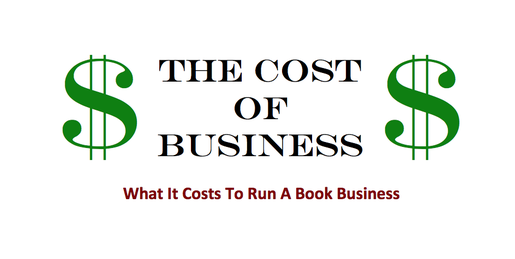Today I received a typical message from a potential customer with whom I have not previously done business. The customer contacted me because he has been looking for a rare and out-of-print book and wanted to know if I might have a copy or know where to find one. As it turns out I did have a copy, one in like new condition, for a price of $20. As far as I know, I am the only person on the internet who has this particular book in stock. When the customer heard the price he responded, “Wow. $20? Let me milk that over a bit.” His response is a typical way of expressing discontent with the price of a book and letting me know that my prices are not “bargain” prices.
While reflecting on my interaction with today’s customer I decided to sit down and explain some of what is involved in running a bookstore. It is my hope that those who read this article will walk away with a better understanding of and appreciation for your local bookstores and book dealers. The topics are arranged in no particular order.
Taxes
Let’s start off by talking about taxes. Most people do not realize that when you sell books on Amazon and Ebay you are legally required to set up a business with your local government, declare all of your sales, pay local sales tax, pay quarterly sales tax, and pay federal tax on either a quarterly or yearly basis. Oh, and there are also inventory taxes; let’s not forget those. To say that taxes add up is an understatement.
People who sell books “under the table”, without paying local or federal taxes need to consider the legality of their practices.
Shipping
There are a number of shipping expenditures involved in selling books. These include postage costs, insurance costs, shipping labels, return shipping costs, packing materials, and postage scales. Packing materials alone cost our company over $1,000 annually. Cutting corners on shipping expenses will cost more in the long run due to lost shipments, damaged shipments, and disgruntled customers.
Web Costs
Selling books on Amazon or Ebay costs the seller roughly 20% of their net sales. Sellers can complain all they want about the seller fees charged by either company, but at the end of the day it costs money to make money.
Running your own website costs money as well. There is the annual cost of maintaining a domain, the annual cost of adding ecommerce capabilities to your site, and the 2-3% credit card fee charged on every transaction.
Stock Issues
There are a number of issues involved with inventory stock that people do not consider. First, you need a place to store books. Second, you have to invest a significant amount of money in building your stock. Third, you have to purchase your stock wisely, or else you will end up with a room full of books that you can’t sell and recoup the cost of your investment. Forth, book inventory is partially determined by what is available, especially in the used book world. There are times when you have money to build your stock but can’t find any books to purchase. Other times there are more books available than you have funds to obtain. Fifth, there is the cost of obtaining books. By this I mean that there are times when you find rare books of great value, yet you have to pay a bit to obtain them. Contrary to popular belief, book dealers do not always buy books at pennies on the dollar.
In order to get a great deal on books you usually have to buy an entire library. Purchasing libraries comes with it’s own share of difficulties. First, libraries are always worth more to the owner than they are to the dealer. Second, libraries generally cost a bit to transport. Third, libraries always contain about 20-40% junk (books are not resalable and can only be trashed).
A final point to keep in mind: you want to have your inventory as low as possible by the end of the year, while still satisfying your customer’s needs, to avoid having to pay lots of inventory tax.
Collection Issues
Collecting money from customers is never fun, especially when they are brethren. No one intentionally refuses to pay their bills, but payments are frequently forgotten and often for long periods of time. Unpaid invoices will some times hinder your ability purchase more inventory at critical moments.
Competition
Amazon and Ebay set the market for used books. When both purchasing and selling you have to be aware of the market price or else you will find yourself upside down.
The competition brought into the book market by Amazon and Ebay is astounding. Once the market is saturated with a title, book dealers will begin cutting their prices to less than the publisher’s cost simply for the sake of clearing out their inventory. The attitude becomes, “It’s better to lose a little than a lot!” It is easy to lose money on new books when the Amazon price dips lower than the publisher’s price. When this happens you either have to cut weight or ride out the storm in hopes that a few years down the road the market will rebound.
Beyond global market competition, there is also local competition. As a dealer you are expected to compete with local bookstores and people who sell books under the table for a lower price. The reason selling under the table is cheaper is because taxes and other fees are not involved. I am frequently told of individuals who are not book dealers and are selling the same books I carry for a lower price. Or, I am told of individuals who use my website and pricing knowledge to undercut my prices to my same market. You can complain that such isn’t fair, but such is life and part of the competition that exists.
Pricing
Everyone is always looking for a bargain. Let’s face it, $20 for a book is more than most people want to pay no matter what the book. People would rather buy 10 sorry books for $2 each than they would a great book for $20. Some will always complain about prices and others will always try to find what you have for a cheaper price. Such is the nature of the game and the need to find books as cheaply as possible for your clients.
Readership
There is a significant lack of readers in our world and especially the church. As a result the number of potential customers is constantly dwindling.
Knowing the interest of readers is important. Knowing topics, genres, authors, and reading levels are important. Being able to recommend a book is one of the most difficult parts of the job. A book that is great to one person has little appeal to another due to the readability of the book and the knowledge of the reader.
If you are going to sell books to people you need to know what they are looking for, how to find it, and how to get it to them cheaper than the competition. If you can’t do all three, rest assured that they will come to you for your knowledge and suggestions, but will likely purchase somewhere else.
Time
Pricing, shipping, stocking, purchasing, packing, unpacking, hauling, sorting, and organizing books all take time and work. If time is money, the cost of books just went up. It also takes considerable time and effort to set up dealer agreements with major book distributors in order to stock new volumes.
Hauling boxes of books to and from meetings, getting to meetings early each service and always being the last one to leave takes a lot of time and work. Again, if time is money, the cost of books just went up.
Ebooks
There is no doubt that the emergence of e-books has hurt the book market. Yet I would argue that e-books have not hurt the value of books as much as Amazon has. I’m not worried about books becoming extinct, but e-books do add another aspect of competition to the book market.
Stocking Brotherhood Books
Some brethren do not understand why I don’t sell certain brotherhood books. The reason is because while I am ok with not making a profit on a book, I am not interested in losing money through taxes and shipping costs in order to increase other people’s book sales. If you are going to run a business you can’t afford to lose money so that other people can make money.
Why Sell Books?
With all that goes into selling books, why bother with it? Many people who have sold books for years find themselves asking the same question and deciding it is no longer worth their time. For now, here are a few reason I still sell books:
First, I sell books in hopes that it encourages others to read books. We need people to read more and study God’s word more. I hope that in selling books and recommending books I can encourage people to love books again. Whenever I get frustrated about having my prices undercut or people deciding to purchase elsewhere, I have to remind myself of why I’m involved in the business to begin with.
Second, I love talking about books, learning about books, and sharing what I have learned about books with others. I have a lot to learn about books and I look forward to learning more and sharing that knowledge with others.
Last of all, selling books has helped me build my own library. There are a number of books that I would not have found or afforded to purchase had I not been dealing books. Though selling books will not provide for retirement, it has fed my book addiction and benefited me in ways I would not have otherwise received.
I want to close by saying thanks to all of our loyal customers for your continued business, support, and encouragement through the years. It has been great working with you and I hope our business has benefitted you and your study of God’s word.


 RSS Feed
RSS Feed
